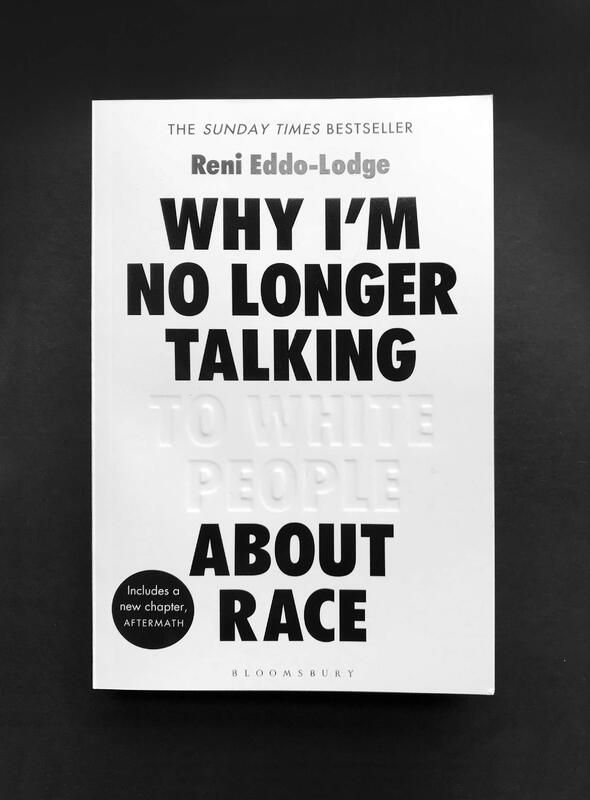Book Review of Reni Eddo-Lodge's Why I'm No Longer Talking To White People About Race

Reni Eddo-Lodge’s Why I’m No Longer Talking To White People About Race was first published in 2017. It shares a title with a blog post she published in 2014, but wrote in 2012 with the same title. She explains how she doesn’t wish to discuss race with those white people who are defensive about their ‘own white privlege and those white people who don’t even believe that it exists. With such a strong opening the reader (if white) is immediately required to reflect on their own attitudes towards racism and forced to confront what may be uncomfortable for them.
The irony of Eddo-Lodge’s claim that she isn’t talking about race, when she spends most of her working life doing just that in the white publishing world isn’t lost on her. Neither is the knowledge that she is inevitably going to have the reprisals and character assassinations that come from the discussion of race. Eddo-Lodge is rightly angry and forceful.
In Why I’m No Longer Talking To White People About Race Eddo-Lodge clearly shows the legitimacy of the claim that structural racism and its symptoms continue to be rampant in today’s society. She does though express hope as she describes how in 2017 she felt that, despite the continuation of far right political progress, the world climate was finally ready to discuss racism. The current popularity of this text must, of course, be related to the ‘Black Lives Matter’ movement. Eddo-Lodge’s claim in the final sentence of ther book ‘It’s happening right now’ was, at the time of publishing, an incredibly accurate prediction of the imminent future
The structure of the text cleverly separates issues into topics in order to enable the reader to consider specific aspects of racism before bringing it back together in order to demonstrate the wider picture of the origins and continuaton of structural racism at all societal levels. Why I am No Longer Talking To White People about Race is a very comprehensive account of the history of racism. It’s chapters on how racism needs to be considered specifically when exploring issues relating to women and class had me reeling. Eddo-Lodge skilfully shows how even in these marginal groups racism exists.
Even though, the time is, I think, ripe for the success of Why I’m No Longer Talking To White People About Race it is currently attaining, it wouldn’t be popular if it wasn’t so honest and accessible. Eddo-Lodge is quick to admit her own failings and concerns. For example, she questions whether it is appropriate to use the Grenfell Tower Disaster to prove a point when the grief that people are feeling is so raw. This openness and tiny glimpses of self-doubt makes Eddo-Lodge very readable. That’s not to say that she is a beacon of humble self-effacement. She is a strong, forceful powerful women whose angry voice rightly asserts itself through the pages.

Book Discussion Questions on Why I'm No Longer Talking To White People About Race
These questions are all based on an acceptance that structural racism and white privilege exists.
How did the title make you feel? Could you relate to the sentiment expressed?
Did you learn anything from Reni-Eddo’s book that you hadn’t known before?
What was the value to you of reading Why I’m No Longer Talking About Race to White People?
Do you think many people will read this book and completely dispute the validity of the arguments made in it?
If Reni-Eddo was here now what would you ask her?
Having read the book what do you think white privilege means?
Do you think anyone can be completely without prejudice?
Do you think you or ‘people’ more generally would respond differently to the book if it was written by a man?
Is it uncomfortable discussing this book in a bookclub environment? Why is this?
if the movement is happening now how will you contribute to it? Discuss?
Is there anything you disagree with in Eddo-Lodge’s account of society?
Do you think there will be many book groups discussing this text? Why or why not?
How would you describe Reni Eddo Lodge’s character?
What chapter of the book did you find most revealing and interesting? Why?
What emotions did you feel as you read the book?
Has reading this book changed your perception about racism? How? Will it change your behaviour?
Is age an excuse for racism?
How would you respond to someone who rejects the ‘black Lives Matter’ statement by claiming that ‘all lives matter?
If you are a white person do you feel that reading Eddo-Lodge’s book has helped give you a platform for discussing racism more freely? Why or why not?
Wold you like to explore how different members of the groups’ experiences regarding racism have been different? What can you learn from each other?
If structural racism pervades our society what can you do to help eradicate it?
Is it possible to feel as passionately about inequality if you are not experiencing it?
Personal Response to Why I'm No Longer Talking To White People About Race
One reading of Why I’m No Longer Talking To White People About Race is not enough. A second reading allows the reader to assimilate and reflect calmly on the points that the reader reacts emotionally to the first time through For anyone who is struggling to really accept the extent of racism that underpins our modern world this book is a real eye-opener. Eddo-Lodge has claimed that white guilt isn’t helpful and rather it is white action that is required. She is right but it is hard to not dwell on the guilt. This was an important point for me to consider.
This powerful, focused book on race is the first about this issue that I’ve seen become a best-seller. It is an essential read.